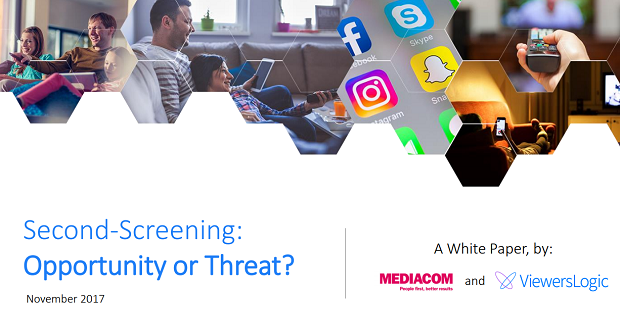The effectiveness of an advert improves when audiences are using a phone/tablet while watching TV, with 75% of viewers more likely to follow up on the ad, according to new research.
The study, from media agency MediaCom and technology company ViewersLogic shows that viewers are much more likely to follow up on a TV advert when simultaneously using their phone or tablet – dispelling one of advertising’s biggest myths that using another device would detract attention away from an advert.
Key findings:
• Using a phone/tablet while watching TV can actually improve the effectiveness of an advert
• Viewers 75% more likely to follow up on an advert they’ve seen on TV if they have a device in hand
• Viewers 10% less likely to change channels if “second screening”
“Second screening” – the act of watching TV while using a mobile or other connected device – actually improves the viewer’s chances of following up on an advert by 75%, thus significantly improving the effectiveness of the ad. The results, taken from 1,877 people in the UK, were consistent across all age groups, gender and TV channels sampled. These results show the ease with which a viewer can access a website/app from the brand they’ve just seen using a mobile device.
Women were more receptive to actively responding to an advert while second screening, with 59% of all their active responses, happening while they were second screening, compared to 51% of men. The 40-54 age group was the most responsive with 57% of all active responses happening while second screening. 55+ was the least responsive with 50%.
In another surprising finding, people who saw adverts while second screening were observed as being more “brand aware” than those who weren’t second screening. One example tested found a 12% point difference in brand awareness between those who were second screening during the ad exposure and those who were not.
The research also found that the “zapping rate” (the average number of channel changes a user does per hour) is 10% lower while viewers are engaged with their mobile phones than without them. This was found to be the case with all age ranges except 18-24, who actually changed channels more frequently while second screening. This makes for particularly encouraging reading for marketers, as those who second screen are likelier to stay longer on their channel and be more affected by the ads.
Pauline Robson, Head of Insight at MediaCom, said: “In the past few years, the way people watch TV has changed quite drastically; on average, people spend around 30% of their TV time simultaneously looking at their phone or tablet. Historically, brands have shuddered at the thought of attention wandering to the second screen. However, our research has flipped that misconception on its head and shown that advertisers should actively look for shows where the audience is most likely to be second screening. Media plans should actively take into account the second screening effect in order to improve efficiency; the opportunities for brands are huge.”
Ronny Golan, CEO and Co-Founder at ViewersLogic, added: “The industry is acutely aware that people have dramatically changed the ways in which they engage with brands and their advertising. At ViewersLogic we believe that this also requires us to radically change the methods we use to gather consumer data. So we established a panel of over 5,000 UK adults to gather single-source data on the TV programmes they watch, the ads they are exposed to, their online searches, and the nature of their shopping trips, online and offline. In our collaboration with MediaCom the technology has enabled some surprising new insights to be uncovered that directly confront a number of myths about the impact of second screening on TV ad effectiveness.”
To access the report, click here

